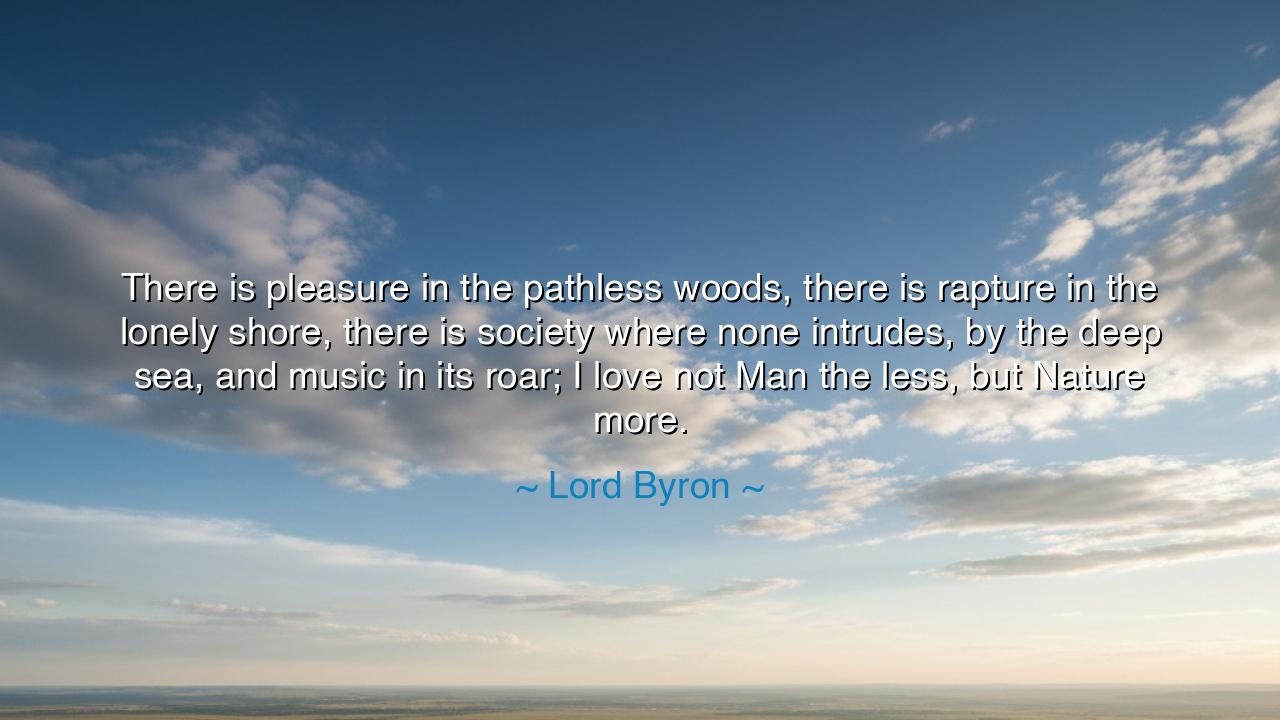
There is pleasure in the pathless woods, there is rapture in the
There is pleasure in the pathless woods, there is rapture in the lonely shore, there is society where none intrudes, by the deep sea, and music in its roar; I love not Man the less, but Nature more.






Harken, O children of wisdom, to the words of a poet whose soul soared in the winds of both nature and emotion—Lord Byron. In his lines, he speaks with longing and reverence for the untamed wilds and the solitude of nature: "There is pleasure in the pathless woods, there is rapture in the lonely shore, there is society where none intrudes, by the deep sea, and music in its roar; I love not Man the less, but Nature more." In these words lies a profound understanding of the connection between the soul and the natural world—a connection that surpasses even the companionship of men and women.
What, then, is the meaning of this declaration? Lord Byron is not a recluse or a misanthrope, for he does not say he hates man, but rather, he declares that he loves nature more than the distractions of human company. In the pathless woods, the unmarked, untrodden places where the human foot rarely steps, there is pleasure to be found. It is the joy of wandering without direction, of moving through a world unmarked by human intervention, where each step brings new discoveries. In nature, there is a purity, an authenticity, that is often lost in the bustle of society. The pathless woods represent the freedom to explore, to reconnect with the primal forces of the earth, unencumbered by the structures of civilization.
In the same breath, Byron speaks of the lonely shore, a place where the land meets the vastness of the ocean, where the soul can feel both small and boundless at once. There, in the solitude of the shore, rapture is found—not in the presence of others, but in the company of oneself and the mighty forces of nature. The waves crash against the rocks, and in that roar, there is a kind of music, a harmony that transcends human understanding. The deep sea is not merely a body of water; it is a symbol of the infinite, the eternal, the unknown. It is a place where the soul can lose itself and, in losing itself, find something deeper, something more authentic than the superficial connections often made with fellow humans.
Let us reflect on the life of the great explorer Marco Polo, who spent many years wandering through lands untouched by his homeland’s influence. In his journeys, he sought not just treasures or knowledge, but a connection with the world itself—a world of vast seas, mountainous landscapes, and remote places that stirred his soul. Polo understood that in the silence of the wilderness, far from the noise of human settlements, one could hear the true music of life. He was drawn not by the company of men, but by the mysteries of the earth, much like Byron was drawn to the sea and the wilds. It was in this solitude that both men found themselves, a communion with nature that was more profound than any social interaction.
So, what lesson do we take from these powerful words? Byron’s message is not a condemnation of humanity, but a call to balance—to recognize that while human connection is essential, there is a deeper connection to be found in the embrace of nature. The pathless woods, the lonely shore, and the roaring sea are all metaphors for the soul’s yearning to return to the primal forces of the earth. Nature offers a kind of solace and fulfillment that is not found in the clamor of human society, where distractions pull us in countless directions. In the quiet of nature, there is clarity, there is peace, and there is a renewal of spirit.
In your own life, O seekers of truth, find moments of solitude in the natural world. Step away from the noise and distractions of the world—whether it be the crowded streets or the endless chatter of society—and find the quiet of a forest, the solitude of a shore, or the vastness of the mountains. In these moments, you will find clarity and peace, and you will be reminded of your place within the greater world. Seek not only the company of men, but also the company of nature, for in its embrace, you will discover a deeper connection to the world and to yourself.
Remember, it is not that humanity is without worth, but that nature offers us a wholeness and a truth that is often lost in the complexities of human interaction. When the world feels heavy, when the noise of life becomes too much, turn to the pathless woods, to the shore, to the deep sea, and there, in the music of its sounds, find the peace you seek. The earth, in all its glory and solitude, is a reflection of the soul’s deepest desires—freedom, clarity, and connection to the eternal. Embrace it, and in its embrace, find your true self.






AAdministratorAdministrator
Welcome, honored guests. Please leave a comment, we will respond soon